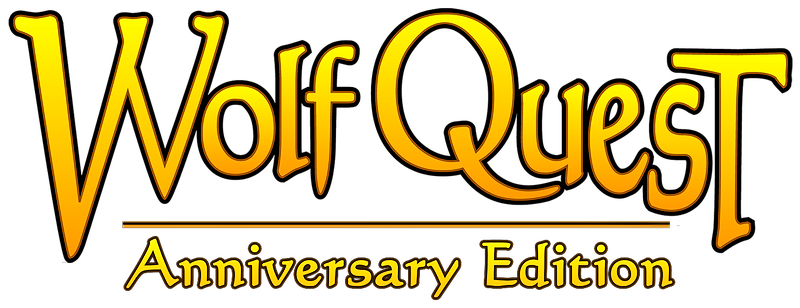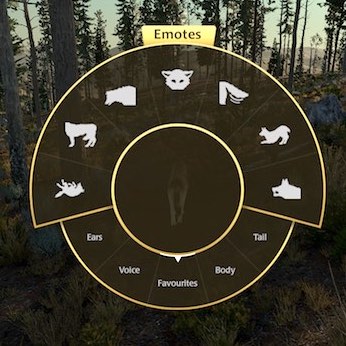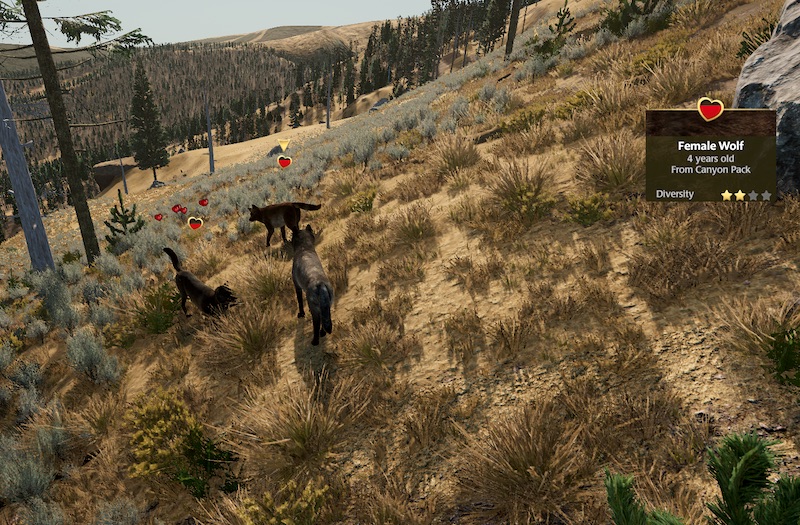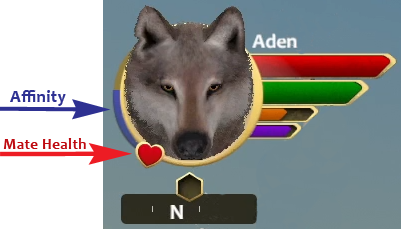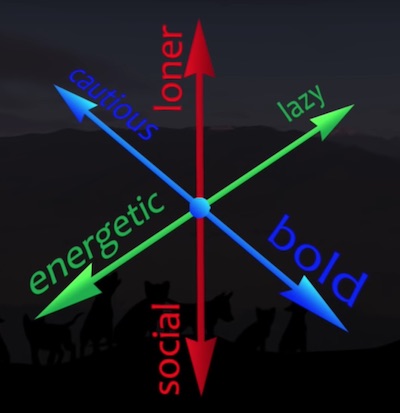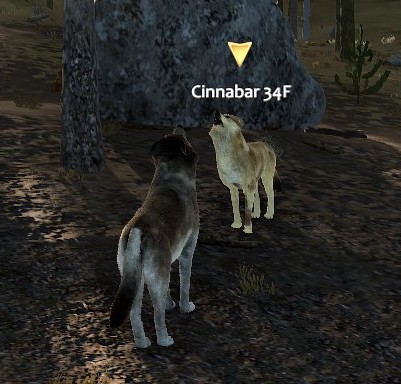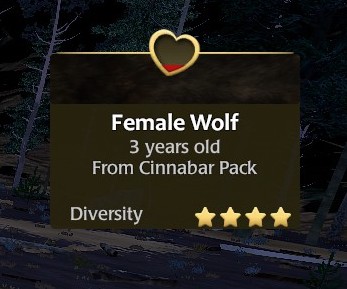Once you have learned to hunt you'll begin to encounter dispersal wolves like yourself, who have left their family pack in search of a mate to start a new pack with. If you venture into other packs' territories, you'll meet wolves who will fiercely defend their territory – and some who you might be able to persuade to leave their pack and become your mate.
Quest Summary
Find a prospective mate, socialize with them and agree to a trial period, spend time getting to know each other and building affinity, decide if you want to make a permanent bond.
How to Find a Mate
Locate Prospective Mates
Howl and nearby dispersal wolves will howl back, with a white icon marking their location on the compass.
Some rival packs may have individuals who are interested in partnering. They are best found in their territories. This is riskiest option since their family members are not friendly. When you howl, rival wolves may also howl back, and if within two kilometers, icons will mark their locations as well.
Courtship
To persuade a wolf to become your mate, try to increase their interest in you by engaging in playful behavior. Some wolves may be eager, while others will take more effort.
When you meet a prospective mate, show your interest by playbowing, wagging your tail, and other friendly actions. (Press the E key to open the Emotes panel.)
When courting, the NPC's heart indicates their interest in you – it fills up with red as they like you more. Be sure to give them time to respond. They will react according to their level of interest. You will also see hearts floating up when they like what you are doing.
Fill up the heart over their head to make and make an initial bond. Once you have filled up the heart of a dispersal, you can agree to a Trial Period. (Any others will then lose interest.)
Trial Period
Now that you've made a good impression on a prospective mate, you will want to go hunting together. That will let both of you see how strong and healthy the other is, before making a final decision about becoming mates.
Hunt and socialize together for several days, gradually increasing your Affinity (the blue meter on left edge of your wolf badge). When it's full, you can decide whether to make this arrangement permanent.
The heart on the wolf badge is your (prospective) mate's health meter – it empties as their health drops. Their affinity with you (and later, the pack's affinity) is indicated by the blue meter on the left side of the wolf badge.
Make the Bond...or Not
I do! If you both agree, you are mates for life!
Hmm...too soon to know! You can extend the trial period and spend some more time together. The game will ask you again in ten minutes if you are ready to decide.
Let's Hang Out! Upon accepting your trial mate, you can now choose to hang out with your mate for awhile, or proceed onward into winter season and Establish Territory quest. If you choose to hang out with your mate, once you're ready to proceed into winter, you can do so via a button in Pack Info.
Go away! Not a good match? To end the courtship with dispersal wolves, growl three times and they will lose interest.
TIPS:
Dispersals travel alone or in small groups. They are generally 2-4 years old. Some opposite-sex dispersals may be interested in partnering with you, as indicated by their actions (and the heart over their head).
Same-sex dispersal wolves will show little interest but are not overtly hostile.
Dispersals: These wolves travel alone or in small groups. They are generally 2-4 years old. Some opposite-sex dispersals may be interested in partnering with you, as indicated by their actions (and the heart over their head). Same-sex dispersal wolves will show little interest but are not overtly hostile.
Rival Pack Wolves: It is also possible to woo a mate from a rival pack, but can take time to find a pack wolf who is interested in leaving their family to join up with you. Generally, rival wolves are quite hostile. If you run into a rival wolf from another pack that may be interested in partnering, they will have a courtship heart above their head and will behave in a friendly manner. Caution: they may be accompanied by hostile pack mates.
Occasionally, you may encounter a pack in which one of the pack leaders has died, and the remaining breeder is looking for a new mate to help lead the pack. If you successfully court such a wolf, you'll have an instant family! (Note that pups of the year will appear on your Family Tree, but older offspring in that pack will not.)
Personality: Some will be bold, ready to dash into a hunt or a fight without hesitation. Others will be cautious, holding back until they feel more confident about their odds. Some will be energetic, moving about constantly, while others will be rather lazy. And some will be quite social, quick to initiate or respond to social actions and emotes. Others will be loners, keeping to themselves.
You can get clues about their personalities by spending time with them and watching how they behave.
Watch: For Better or For Worse: Mate Personalities
Wolf Names:
- Your mate's name: Once you bond with a mate, you can rename them. To view their name: press N key or see Pack Stats
- Dispersal wolves and stranger wolves' names tell you:
- pack name (e.g. Hayden, Junction Butte, Cinnabar...),
- a number (like those assigned by scientists who study Yellowstone wolves)
- gender (M=male and F=female).
Diversity: Genetic diversity is indicated by stars in dispersal's info (displayed in the upper right of screen). To produce healthy pups, higher diversity (more stars) is better. Diversity is affected by several factors, which are calculated for each prospective mate and then used to generate that wolf's diversity rating relative to your wolf:
- Relatedness: Neighboring pack dispersals may be more closely related to each other (and thus have lower diversity).
- Coat Color: Two wolves with black coats tend to have smaller but healthier litters, while two grays or a gray and a black will have larger litters, but some pups will be more susceptible to disease. Watch this video to learn about the WolfQuest genetics system: Genes Behind the Scenes. Regardless of their parents' coat colors, pups are likely to get sick at some point.
For Better or For Worse: Your mate will stick by you no matter what...even if you growl a lot. You and your mate cannot harm each other.
Until Death Do Us Part: Choosing Mate Permadeath in Game Settings may result in the death of your mate. If they die, a new Find a New Mate subquest is triggered, so you can seek out dispersals or pack wolves to court. If your mate is female and dies before giving birth to pups, the game will end. Note: you will note have a trial period when choosing a new mate.
QUEST COMPLETE
A wolf's life is about one thing: passing on its genes to the next generation. All else, from hunting elk to defending a territory, drives toward this single goal. You and your mate survived the hazards of the wilderness long enough to meet each other, form a bond, and survive the winter. Now you can try to realize this goal. With pups of your own, you and your mate will become the breeding pair (sometimes called "alphas") of your pack. Their survival — and the survival of your genetic code — will be your responsibility. Even with all the dangers you have faced to reach this point, your real struggle has only just begun.
Once you have completed the Find a Mate quest, you are ready to do the Establish Territory quest.
